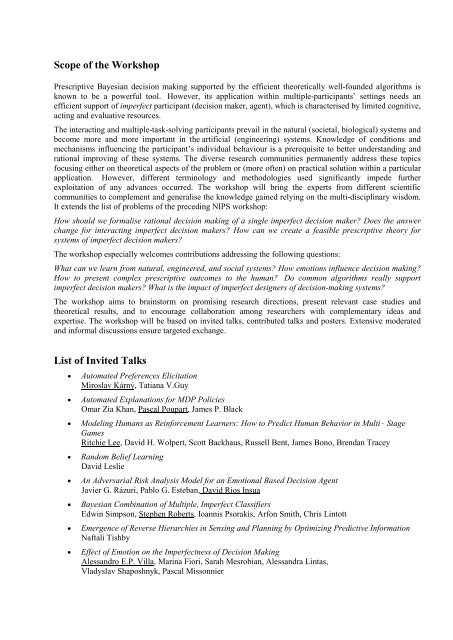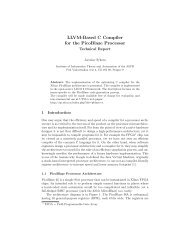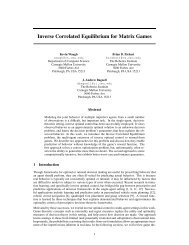decision making with multiple imperfect decision makers - Institute of ...
decision making with multiple imperfect decision makers - Institute of ...
decision making with multiple imperfect decision makers - Institute of ...
Create successful ePaper yourself
Turn your PDF publications into a flip-book with our unique Google optimized e-Paper software.
Scope <strong>of</strong> the WorkshopPrescriptive Bayesian <strong>decision</strong> <strong>making</strong> supported by the efficient theoretically well-founded algorithms isknown to be a powerful tool. However, its application <strong>with</strong>in <strong>multiple</strong>-participants’ settings needs anefficient support <strong>of</strong> <strong>imperfect</strong> participant (<strong>decision</strong> maker, agent), which is characterised by limited cognitive,acting and evaluative resources.The interacting and <strong>multiple</strong>-task-solving participants prevail in the natural (societal, biological) systems andbecome more and more important in the artificial (engineering) systems. Knowledge <strong>of</strong> conditions andmechanisms influencing the participant’s individual behaviour is a prerequisite to better understanding andrational improving <strong>of</strong> these systems. The diverse research communities permanently address these topicsfocusing either on theoretical aspects <strong>of</strong> the problem or (more <strong>of</strong>ten) on practical solution <strong>with</strong>in a particularapplication. However, different terminology and methodologies used significantly impede furtherexploitation <strong>of</strong> any advances occurred. The workshop will bring the experts from different scientificcommunities to complement and generalise the knowledge gained relying on the multi-disciplinary wisdom.It extends the list <strong>of</strong> problems <strong>of</strong> the preceding NIPS workshop:How should we formalise rational <strong>decision</strong> <strong>making</strong> <strong>of</strong> a single <strong>imperfect</strong> <strong>decision</strong> maker? Does the answerchange for interacting <strong>imperfect</strong> <strong>decision</strong> <strong>makers</strong>? How can we create a feasible prescriptive theory forsystems <strong>of</strong> <strong>imperfect</strong> <strong>decision</strong> <strong>makers</strong>?The workshop especially welcomes contributions addressing the following questions:What can we learn from natural, engineered, and social systems? How emotions influence <strong>decision</strong> <strong>making</strong>?How to present complex prescriptive outcomes to the human? Do common algorithms really support<strong>imperfect</strong> <strong>decision</strong> <strong>makers</strong>? What is the impact <strong>of</strong> <strong>imperfect</strong> designers <strong>of</strong> <strong>decision</strong>-<strong>making</strong> systems?The workshop aims to brainstorm on promising research directions, present relevant case studies andtheoretical results, and to encourage collaboration among researchers <strong>with</strong> complementary ideas andexpertise. The workshop will be based on invited talks, contributed talks and posters. Extensive moderatedand informal discussions ensure targeted exchange.List <strong>of</strong> Invited Talks• Automated Preferences ElicitationMiroslav Kárný, Tatiana V.Guy• Automated Explanations for MDP PoliciesOmar Zia Khan, Pascal Poupart, James P. Black• Modeling Humans as Reinforcement Learners: How to Predict Human Behavior in Multi˗ StageGamesRitchie Lee, David H. Wolpert, Scott Backhaus, Russell Bent, James Bono, Brendan Tracey• Random Belief LearningDavid Leslie• An Adversarial Risk Analysis Model for an Emotional Based Decision AgentJavier G. Rázuri, Pablo G. Esteban, David Rios Insua• Bayesian Combination <strong>of</strong> Multiple, Imperfect ClassifiersEdwin Simpson, Stephen Roberts, Ioannis Psorakis, Arfon Smith, Chris Lintott• Emergence <strong>of</strong> Reverse Hierarchies in Sensing and Planning by Optimizing Predictive InformationNaftali Tishby• Effect <strong>of</strong> Emotion on the Imperfectness <strong>of</strong> Decision MakingAlessandro E.P. Villa, Marina Fiori, Sarah Mesrobian, Alessandra Lintas,Vladyslav Shaposhnyk, Pascal Missonnier







